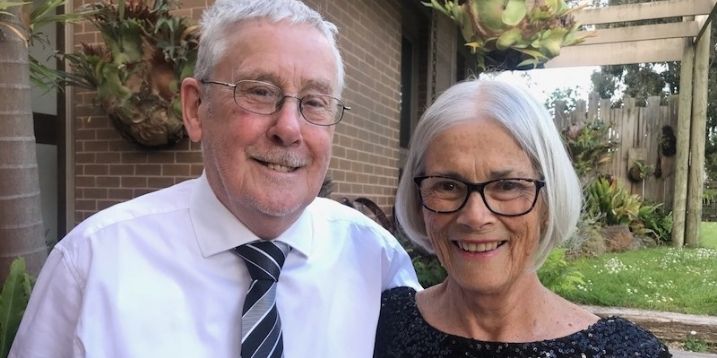
In April 2019, Ken lost his wife Dale to cancer. It was a heartbreaking journey, but made more bearable by the fact that Dale developed an advance care directive three years before she died.
The advance care directive made sure that her family, her doctors and everyone involved in her care had clear instructions on how to best care for Dale when she reached that point that she could no longer speak for herself.
More importantly, it meant that Dale’s last weeks were spent enjoying what time she had left, making memories with family and receiving treatments that focussed on increasing the quality of life.
With the support of family, friends and her medical team, Dale squeezed a lot of living in to those last weeks. They were filled with laughter, tears, friends, family and noisy grandkids – just how she had wanted it.
During every step of Dale’s journey, her husband Ken was by her side. We asked Ken to share six things he learned about advance care planning through his experience with his wife Dale.
It’s a personal statement
Dale was always a super organised person and liked to plan everything. Every family has a planner and ours was Dale. I had heard about advance care planning and when I raised it with Dale she agreed it would be a good idea. I think the concept of planning ahead appealed to her practical side.
As her cancer progressed I think Dale recognised advance care planning as an opportunity to be clear about what she wanted. Dale had always had a strong sense of herself. She was always sure about what was important to her and what she wanted in life and this guided her decisions through her cancer journey.
Advance care planning made a lot of sense to Dale. It gave her a sense of control. She could see the benefit in making sure her family, her doctors and everyone caring from her, had clear guidance about what care she wanted, at the point where hard decisions had to be made.
It’s ok to have questions
Before Dale was able to commit anything to paper she needed to do her research. For Dale, advance care planning triggered a lot of questions which she explored with her doctors. She wanted to know about the different scenarios and the likely progression of her cancer. Her doctors were so patient and caring with Dale. They were really tough conversations but her doctors handled this so respectfully. I think it helped Dale knowing that she had all the facts she needed to help her make informed decisions and to create a plan that best reflected her wishes.
It’s about family
We are a close knit family that is used to doing things together, so advance care planning was a chance to get the family involved. Dale was remarkably open about talking about her values and at what point she would opt for less aggressive treatment with me and our daughter, Lisa. We spent time around the kitchen table helping Dale completing the form. I remember there was a lot of discussion and the odd moment of laughter, mixed with some sadness. It just felt right that we could do this together and support each other.
Dale appointed me as her substitute decision-maker so she had peace-of-mind that I could step in, should her health deteriorate quickly.
It helps others know how to care for you
In Dale’s final weeks she was admitted to a palliative care unit. The nurses and hospital staff were almost relieved when we arrived with Dale’s advance care directive with clear instructions on what she wanted and who was empowered to make her decisions if she was unable to. They commented on how much easier and clearer it was to provide appropriate care when these things had been resolved ahead of time.
It can inspire others
Having lived through this experience with Dale and my family, I’m very passionate about advance care planning. For us, advance care planning meant that Dale’s final weeks were relatively calm and filled with the things that were important to her – her children, friends and grandkids. Just as she had written in her plan, her pain and other symptoms were managed, making it easier for all of us to be there and say our goodbyes.
While I am in relative good health myself, I have written my own advance care directive and have encouraged others to do the same. Through friends I have seen what can go wrong when there is no plan - the disagreements, the stress, the uncertainty - it really is no way to die. At a time when everyone should be pulling together, I’ve seen families pulled apart as everyone tries to guess what their loved one would want. Advance care planning puts a stop to all the guessing.
It doesn’t mean giving up hope
I think for some people with cancer, they might feel that advance care planning is the final step or what you do when your treatment stops. But it’s just not true. Dale wrote her advance care directive while she was still having cancer treatment. She was not giving up and she didn’t lose hope. Dale continued to plan holidays and adventures which she enjoyed all the more because she knew that if anything happened that she had her plan in place.